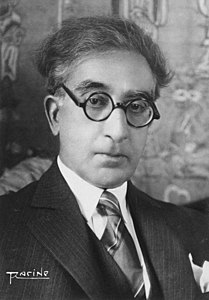Analysis of King Claudius
Constantine P. Cavafy 1863 (Alexandria) – 1933 (Alexandria)
My mind now moves to distant places.
I'm walking the streets of Elsinore,
through its squares, and I recall
the very sad story-
that unfortunate king
killed by his nephew
because of some fanciful suspicions.
In all the homes of the poor
he was mourned secretly
(they were afraid of Fortinbras).
A quiet, gentle man,
a man who loved peace
(his country had suffered much
from the wars of his predecessor),
he behaved graciously toward everyone,
humble and great alike.
Never high-handed, he always sought advice
in the kingdom's affairs
from serious, experienced people.
Just why his nephew killed him
was never actually explained.
The prince suspected him of murder,
and the basis of his suspicion was this:
walking one night along an ancient battlement
he thought he saw a ghost
and he had a conversation with this ghost;
what he supposedly heard from the ghost
were certain accusations against the king.
It must have been a fit of fancy,
an optical illusion
(the prince was nervous in the extreme;
while he was studying at Wittenberg,
many of his fellow students thought him a maniac).
A few days later he went
to his mother's room to discuss
certain family affairs. And suddenly,
while he was talking, he lost his self-control,
started shouting, screaming
that the ghost was there in front of him.
But his mother saw nothing at all.
And that same day, for no apparent reason,
he killed an old gentleman of the court.
Since the prince was due to sail for England
in a day or two,
the king hustled him off post-haste
in order to save him.
But the people were so outraged
by the monstrous murder
that rebels rose up
and tried to storm the palace gates,
led by the dead man's son,
the noble lord Laertes
(a brave young man, also ambitious;
in the confusion, some of his friends called out:
'Long live King Laertes!').
Later, once the kingdom had calmed down
and the king was lying in his grave-
he was killed by his nephew, the prince,
who never went to England
but escaped from the ship on his way there-
a certain Horatio came forward
and tried to exonerate the prince
by telling some stories of his own.
He said that the voyage to England
had been a secret plot, and orders
had been given to kill the prince there
(but this was never clearly ascertained).
He also spoke of poisoned wine-
wine poisoned by the king.
It's true that Laertes spoke of this too.
But couldn't he have been lying?
Couldn't he have been mistaken?
And when did he say all this?
While dying of his wounds, his mind reeling,
his talk seemingly delirious.
As for the poisoned weapons,
it was shown later that the poisoning
hadn't been done by the king at all:
Laertes himself had done it.
But Horatio, whenever pressed,
would produce even the ghost as a witness:
the ghost said this and that,
the ghost did this and that!
Because of all this, though letting Horatio talk,
most people in their hearts
pitied the poor king,
who, with all these ghosts and fairy tales,
was unjustly killed and disposed of.
Yet Fortinbras, who profited
by winning the throne so easily,
gave full attention and weight
to every word Horatio said.
| Scheme | Text too long |
|---|---|
| Poetic Form | |
| Metre | 111111010 11001110 111011 010110 101001 11110 0111100010 0101101 111100 100111 010101 01111 1101101 10111100 1011000110 100101 1011011101 001001 1100010010 1111011 11010001 010101110 00101101011 101101110100 111101 0110010111 1101001101 0100100101 111101110 1100010 011100001 1111001100 1011101011010 0111011 11101101 10100010100 11110111101 101010 101110111 111011011 01111101010 1111100101 1011111110 00111 01101111 010111 1010011 101010 11011 01110101 110111 01011 011110010 00010111111 1111 101010111 001110011 111111001 1101110 1011011111 010010110 01101001 110110111 111010110 110101010 111011011 111101001 11011101 110101 11111111 11011110 10111010 0111111 1101111110 111000100 1101010 1111010100 101110111 101111 10100101 10110011010 011101 011101 011111100101 110011 1011 111110101 101010011 111100 110011100 1101001 110010101 |
| Closest metre | Iambic tetrameter |
| Characters | 3,012 |
| Words | 555 |
| Sentences | 28 |
| Stanzas | 1 |
| Stanza Lengths | 92 |
| Lines Amount | 92 |
| Letters per line (avg) | 27 |
| Words per line (avg) | 6 |
| Letters per stanza (avg) | 2,444 |
| Words per stanza (avg) | 552 |
Font size:
Submitted on May 13, 2011
Modified on May 02, 2023
- 2:49 min read
- 470 Views
Citation
Use the citation below to add this poem analysis to your bibliography:
Style:MLAChicagoAPA
"King Claudius" Poetry.com. STANDS4 LLC, 2024. Web. 28 Apr. 2024. <https://www.poetry.com/poem-analysis/7186/king-claudius>.


Discuss this Constantine P. Cavafy poem analysis with the community:
Report Comment
We're doing our best to make sure our content is useful, accurate and safe.
If by any chance you spot an inappropriate comment while navigating through our website please use this form to let us know, and we'll take care of it shortly.
Attachment
You need to be logged in to favorite.
Log In